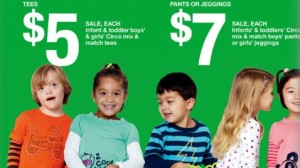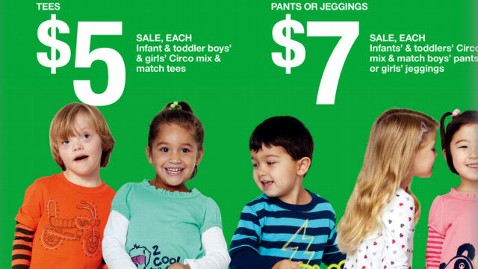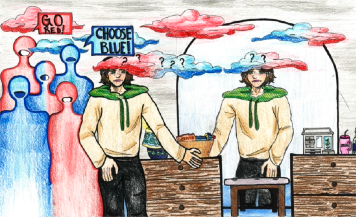By Casey Jacobson, Editor
The best part about the ad was what it didn’t say. It didn’t say, “Look! Here is a mentally disabled child that we put in our magazine!” It didn’t say, “Our magazine is making a difference by including down syndrome children to model for us!” And the ad especially didn’t say, “Our company is better than yours because we feature children with disabilities.” The ad was just like any other ad you would see for a department store.
What it didn’t say said the most.

In this particular ad for Target, the headline reads “Tees, pants and jeggings on sale!” where children are displayed for each of these clothing styles. Of course five little beauty-gifted boys and girls modeling their perfectly matching outfits are seen. The first of these five children happened to be a precious blond haired, blue eyed boy modeling a bright orange shirt with a bicycle on it.
That little boy has Down syndrome, and his smile was full of life.
Nowhere on the page was it mentioned that this little boy had disabilities or special needs. His shirt didn’t read, “I’m proud to be who I am.” The cover of the magazine didn’t read “We are happy to be featuring a mentally disabled child in this issue!”
His name wasn’t included, and he was just showing off his adorable smile with the little girl next to him. He was treated like any other child model in the issue.
The six year old’s name is Ryan Langston, and he is a pro is the modeling world. He has not only he modeled for Target, but also for some of Nordstrom’s ads.
“He’s so proud of himself, and it is a huge confidence booster,” said Ryan’s parents on the website Disability Scoop.
According to the National Association for Down Syndrome, the most important fact about people with Down syndrome is that they are more alike others than different.
Down syndrome is a condition that causes delays in physical and intellectual development. People who have Down syndrome have 47 chromosomes instead of the normal 46.
In a blog called “Noah’s Dad,” the father of a child with Down syndrome blogs about his son and the special needs community. For privacy reasons, the father identifies himself as Rick, and he applauded Target for their inclusive stance for children with special needs.
He said that people born with Down syndrome deserve to be treated the same as every other person on this planet. Along with Rick, Target said it’s important for the world to see people born with disabilities with a fresh set of eyes and it’s time for us to lay down all the inaccurate stereotypes from the past.
“It is important for special needs students to be treated like everyone else so that they can live a normal life and learn to do things on their own” Kenzie Powell, member of P.E. Leadership, said.
Not only do these stereotypes fall onto Down syndrome patients, but any other mentally disabled patient such as a child diagnosed with autism.
“When most people first come across someone with a disability, they automatically think ‘Oh, I need to treat this person differently,’ when in reality they [the special needs community] have thoughts and feelings just like anyone else,” Tom Fox, a P.E. Leadership student, said.
Down syndrome children or any other mentally disabled child wants to be treated just like any other. They want to be able to have fun and socialize just like their peers, and Target silently showed how that is possible.
“It is very essential for the [special needs community] to be treated like everybody else because they are building skills like anyone else, and the more they are treated like their peers, the more they can develop and grow,” Theresa Biddle, special education teacher, said.
Being able to interact and grow with their peers is something special that Kaneland High School is able to offer through the P.E. Leadership program.
“[Interacting and being treated like their peers] gives them more of the sense of belonging and also shows them that they have real friends,” Brian Willis, P.E. Leadership teacher, said.
Companies do not have to dramatically draw the attention that they are featuring children with disabilities to show the support they have for them. In fact, by directly pointing out these children, that is doing the absolute opposite of trying to make them feel like everybody else.
By acting like it’s really not a big deal to have special needs children modeling in their ad, it’s making it a really big deal for these children trying to get equal treatment.
Society has been more and more inclusive of the special needs community in modeling, television shows or movies.
Down syndrome actors can be seen on commercials or TV shows such as Fox’s Glee, which includes a Down syndrome teen, Becky, who is the assistant cheerleading coach. The head cheerleading coach, Sue Sylvester, also has an older sister who has Down syndrome.
Although the media is making more and more appearances of the special needs actors and actresses, such a nonchalant representation of them is still hard to find.
Target is leading the way by giving the special needs community the treatment they deserve. Society needs to rid the past stereotypes of “specializing” or “separating” this community and start embracing the bright future these children have.








